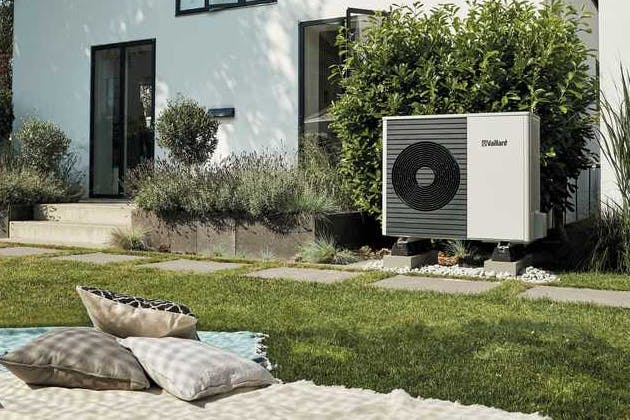Heat pumps are a renewable energy appliance that sustainably uses the heat in our surroundings (the environment) and converts it into heat energy for your home. There are different variations of heat pumps, but the most common heat pump systems are:
Ground source heat pumps (GSHP)
Water source heat pumps (WSHP)
Air source heat pumps (ASHP)
What are ground source heat pumps?
GSHPs are an alternative heating system to conventional gas or oil boilers that most people have installed in their homes in Winterbourne. They are units that are installed inside a property or in an external room and they circulate heat from the ground and raise its temperature before distributing the heat to provide hot water and space heating via radiators, and perhaps underfloor heating if it's present at the property. GSPHs are powered by electricity and are a clean and combustion-free technology that doesn't use fossil fuels! This is an incredibly green alternative to home heating.
How do ground source heat pumps work?

Are water heat pumps a good alternative?
Water source heat pump installations involve installing the heat pump inside a property or external building. These pumps are far less common than ground and air source heat pumps. There are two types of water heat pumps; open loop and closed loop pumps.
Water heat pumps generate energy by circulating brine through the collector in the system, absorbing the heat energy from the surrounding water. The heat energy is then passed through a compressor which raises the temperature to a usable level and circulates it onto your heat distribution system (radiators, underfloor heating, hot water cylinder) to provide heating and hot water.
What is an Open Loop Water Source Heat Pump?
An open-loop system will extract and filter the water from the water source and circulate it through the system. It’s then released back into another section of the water source or other acceptable alternatives such as a water well or borehole. Open-loop systems differ from closed-loop collectors as they don’t use a heat transfer fluid, the water itself is the fluid. They can be the more efficient option but due to a large amount of water needed, system lifespan can decrease and even with the best design they can be prone to clogging.
What is a Closed Loop Water Source Heat Pump?
A closed-loop system will circulate a mixture of water and refrigerant (often referred to as brine) through the collectors submerged in the water source. The water from the source cannot get into the pipes, the energy is collected through the brine and circulated to the heat pump.
Air source heat pumps: the best renewable heating appliance?
Air source heat pumps (ASHPs) are installed outside a property which uses thermal energy from the outside air to provide heating and hot water for a building. Air source heat pumps are a low-carbon, renewable technology. They offer efficiencies up to 300% (most gas boilers are 90% for context!) which can significantly reduce the size of your energy bill.
There are a number of reasons why we believe that air source heat pumps are the best renewable heating installation that you could choose to have. We have outlined some of these reasons below...
It’s a system that is free from burning fossil fuels, and this brings huge advantages over gas or oil-fuelled heating systems, which means zero carbon emissions produced from your home
Air source heat pumps are also relatively quick to install, require little maintenance and have a long lifespan of around 20 years, making them highly useful from an ROI point of view.
Intelligent zone controls and the ability to simultaneously heat one room whilst cooling another (ideal for different temperature preferences or for commercial manufacturing processes)
Government incentives are available to homeowners for funding the installation cost of an air source heat pump. Read more about this in our blog post on the RHI.
If you choose an air source heat pump, you will save space inside your property as air source heat pumps are installed outdoors
Get in touch for a heat pump installation today
To enquire about a heat pump installation in your home in Thornbury then get in touch with your local renewable experts at C Brookes Heating and Plumbing on 07716 101545 or get in touch using our website contact form.



